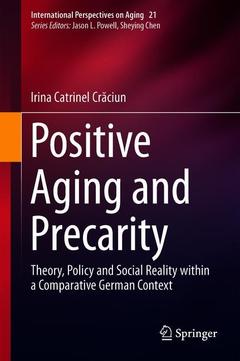Positive Aging and Precarity, 1st ed. 2019 Theory, Policy, and Social Reality within a Comparative German Context International Perspectives on Aging Series, Vol. 21
Auteur : Crăciun Irina Catrinel

This book explores positive aging through the lens of precarity, aiming to ground positive aging theories in current social contexts. In recent years, research on aging has been branded by growing disagreements between supporters of the successful aging model and critical gerontologists who highlight the widening inequalities, disadvantages and precarity that characterize old age. This book comes to fill a gap in knowledge by offering an alternative view on positive aging, informed by precarity and its impact on projections concerning aging.
The first part of the book places aging in broader theoretical and empirical context, exploring the complex links between views on aging, successful aging theories, policy and social reality. The second part uses results from a qualitative research conducted in Germany to illustrate the dissonance between successful aging ideals and both negative and positive views on aging as well as aging preparation strategies inspired by precarity. Findings from this section provide a solid starting point for comparisons with countries that are both similar and different from Germany in terms of welfare regimes and aging policies. The final part of the book discusses the psychological implications of these findings within and beyond the German case study and outlines potential solutions for practice.
This book provides health psychologists, gerontologists, sociologists, social workers, health professionals as well as students and aging individuals themselves with better understanding of the meaning of aging in precarious times and builds confidence about aging well despite precarity.
Dr Irina Catrinel Crăciun is associate professor in health psychology at the Babeş- Bolyai University in Cluj, Romania and has been guest professor of health and gender at the Freie Universität Berlin. She also works as a health psychology practitioner and is vice-president of the Romanian Health Psychology Association. She received her PhD in health psychology at the Freie Universität Berlin (supervised by prof. dr. Ralf Schwarzer) and subsequently held a post-doctoral research grant on resources for positive aging, sponsored by the Alexander von Humboldt Foundation. Several articles resulted from this project and were published in journals such as The Gerontologist, Journal of Aging Studies and Journal of Health Psychology and Journal of Women and Aging. Her research interests include a wide range of topics from health behaviour change to health communication and exploring aging, gender and psychosocial health determinants. Her recent studies focus mainly on aging and health perceptions in vulnerable populations such as aging precarious individuals, and the prevention of gender and social inequalities in health.
Applies an innovative and fresh psychological angle to understanding experiences of aging and precarity
Builds critical interdisciplinary links between health psychology, social gerontology and sociology by examining relations between positive aging, views on aging and precarity
Demonstrates a strong focus on connecting theory with practice and effectively addressing implications for psychological counselling and policy
Date de parution : 05-2019
Ouvrage de 194 p.
15.5x23.5 cm
Disponible chez l'éditeur (délai d'approvisionnement : 15 jours).
Prix indicatif 105,49 €
Ajouter au panierThèmes de Positive Aging and Precarity :
Mots-clés :
Positive aging theory; Successful aging theory; Life course perspectives and process models versus outcomes; The politics of positive aging; Policy development and views on aging; WHO; the EU; and changing views on aging; Social realities of aging and the precariat; The middle-aged precariat in Germany; German case studies on aging; Preparing socially; financially; and physically for old age; Precarity and the accumulation of health inequalities; Ageism in the workplace; Positive aging in the context of pre



